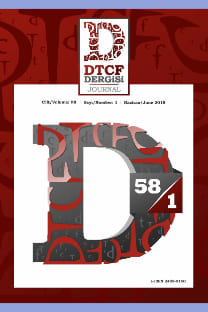Roma’nın Günahkar Consul’ü: Gaius Flaminius
Gaius Flaminius, İÖ üçüncü yüzyılın ikinci yarısında, Roma devletinin, Alpleri aşıp İtalya’yı işgal eden Kartacalı komutan Hannibal ile çetin bir mücadeleye giriştiği dönemde yaşamıştır. Arkasındaki halk desteği sayesinde devlet içinde önemli görevler üstlenmiş, siyasi yaşamda önemli bir kişi haline gelmiştir. İÖ 217 yılında Hannibal’le yaptığı savaşta yaşamını yitirmiştir. Siyasi yaşamı boyunca Roma devlet dininin temsilcileriyle sürekli bir sürtüşme içinde olmuş, onunla ilgili olarak dini kurallara uymadığı yönünde çok sayıda karar alınmıştır. Eskiçağ yazarlarından bazıları onun, dinin gereklerine önem vermediği için devleti felakete sürüklediğini aktarmışlardır. Çalışmada, C. Flaminius’un siyasi yaşamı, yapmak istedikleri ve din görevlilerinin onun hakkında verdiği olumsuz kararlar değerlendirilerek Eskiçağ kaynaklarında din düşmanı ve bir günahkâr olarak sunulmasının altında yatan nedenler ortaya çıkarılmaya çalışılmıştır.
The Sinful Consul of Rome: Gaius Flaminius
Gaius Flaminius lived in the second half of the 3rd century BC., the period in which Roman constitution ran into a great battle with Carthaginian general Hannibal, who invaded Italy, after crossing the Alps. Owing to the support of plebeian order, Flaminius became an important actor in political life of Rome. In 217 BC. he died in the battle against Hannibal. During his political career, he rub against the priests of the Roman State religion and encountered many decisions in which he was accused by them that he disregarded the rules of religion. Some of the ancient historians depicted him as a responsible for a serious blow inflicted upon the state because of his negligence towards the gods. This study will try to expose the real causes of this literary tradition which showed Flaminius as an enemy of the state religion and a sinful man.
___
- BEARD, Mary and John. A. North. (1990). Pagan Priests : Religion and Power in the Ancient World. Ithaca, New York: Cornell University Press.
- BEARD, Mary, John. A. North and Simon Price. (1998). Religions of Rome: Volume 1: A History, Cambridge: Cambridge University Press.
- BROUGHTON, T. Robert. S. (1951). The Magistrates of the Roman Republic Vol.1: 509 B.C.-100 B.C. New York: American Philological Association.
- CASSOLA, Filippo. (1962). I Gruppi Politici Romani nel III Secolo A.C. Trieste: Instituto di Storia Antica.
- DEGRASSI, Atilio. (1947). Inscriptiones Italiae, Vol. 13: Fasti et Elogia, Fasc. 1: Fasti Consulares et Triumphales, Tabulae et Indices. Roma: Libreria Dello Stato.
- DE SANCTIS, Gaetano. (1916). Storia dei Romani Vol. 3: L’Eta Delle Querre Puniche Parte 1. Milano: Bocca.
- DEVELIN, Robert. (1978). "Religion and Politics at Rome During the Third Century BC". Journal of Religious History. 10: 3-19.
- DEVELIN, Robert. (1979). "The Political Position of C.Flaminius". Rheinisches Museum für Philologie 122: 268-277.
- DOREY, Thomas. A. (1955). "The Dictatorship of Minucius". The Journal of Roman Studies. 45: 92-96.
- DÜRÜŞKEN, Çiğdem. (2000). Roma'nın Gizem Dinleri. İstanbul: Arkeoloji ve Sanat Yayınları.
- DÜRÜŞKEN, Çiğdem. (2003). Roma Dini. İstanbul: Türk Eski Çağ Bilimleri Enstitüsü.
- FINLEY, Moses. I. (1983). Politics in the Ancient World. Cambridge: Cambridge University Press.
- FRACCARO, Plinio. (1919). "Lex Flaminia de agro Gallico et Piceno viritim dividundo". Athenaeum. 7: 73-93.
- GELZER, Matthias. (1933). "Römische Politik bei Fabius Pictor". Hermes. 68: 129- 166.
- JOCELYN, Henry. D. (1966). "The Roman Nobility and the Religion of the Republican State". Journal of Religious History. 4: 89-104.
- KRAMER, Frank. R. (1948). "Massilian Diplomacy before the Second Punic War". The American Journal of Philology. 69: 1-26.
- LINDERSKI, Jerzy. (1986). "The Augural Law". Aufstieg und Niedergang der römischen Welt 2.16: 2146-2312.
- MACBAIN, Bruce. (1982). Prodigy and Expiation : a Study in Religion and Politics in Republican Rome. Bruxelles: Latomus Revue D'Études Latines.
- MAGDELAIN, André. (1964). "Auspicia ad Patres Redeunt". In Hommages à Jean Bayet. (Ed. M. Renard & R. Schilling). (427-473). Bruxelles: Latomus.
- MENZİLCİOĞLU, Çiğdem. (2009). "Cicero Tanrı-Tanımaz mı?" Kutadgubilig. 15: 77-86.
- MOMMSEN, Theodor. (1983). Inscriptiones Latinae Antiquissimae: Accedunt Elogia Clarorum Virorum, Fasti Anni Iuliani, Fasti Consulares ad A.V.C. DCCLXVI. Berolini: Reimer.
- PASCHALL, Dorothy. (1936). "The Origin and Semantic Development of Latin Vitium". Transactions and Proceedings of the American Philological Association. 67: 219-231.
- ROSENBERGER,Veit. (2007). "Republican Nobiles: Controlling the Res Publica". In A Companion to Roman Religion. (Ed. J. Rüpke). (292-303). Oxford: Blackwell Publishing.
- SCULLARD, Howard. H. (1973). Roman Politics, 220-150 B.C. Oxford,: Clarendon Press.
- STAVELEY, E. Stuart. (1963). "Review: I Gruppi Politici Romani nel III Secolo A.C by Filippo Cassola". The Journal of Roman Studies. 53: 182-187.
- STAVELEY, E. Stuart. (1989). "Rome and Italy in the Early Third Century". In Cambridge Ancient History, Vol.7.2. (Ed. F. W. Walbank). (420-455). Cambridge: Cambridge University Press.
- STEWART, Roberta. (1998). Public Office in Early Rome: Ritual Procedure & Political Practice. Michigan: The University of Michigan Press.
- VAAHTERA, Jyri. (2001). Roman Augural Lore in Greek Historiography. Stuttgart: Franz Steiner Verlag.
- WALBANK, Frank. W. (1957). A Historical Commentary on Polybius, vol.I. Oxford: Clarendon Press.
- ISSN: 0378-2905
- Yayın Aralığı: Yılda 2 Sayı
- Başlangıç: 1942
- Yayıncı: Ankara Üniversitesi Dil ve Tarih-Coğrafya Fakültesi
Sayıdaki Diğer Makaleler
Çin yazısının tarihçesi ve Çincede sözcük türetme yolları
Bir Hint dramı: M$overline{a}$lavik$overline{a}$gnimitra
Roma’nın Günahkar Consul’ü: Gaius Flaminius
Bir Hint dramı: M$\overline{a}$lavik$\overline{a}$gnimitra
Virginia Woolf, Orlando ve İstanbul
In search of the uncanny in the narratives of the Great War
Nevşehir ve Ürgüp’te şehirleşmenin biyoklimatik koşullar üzerine etkisi
